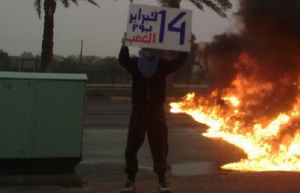By Max Security’s Intelligence Department
The Shia-led opposition does not aim to directly threaten foreigners doing business in the capital, they instead seek to make Manama a generally less attractive place to do business.

This week, Bahrain’s Shia opposition groups are engaging in a multi-faceted campaign of civil disobedience dubbed “Week Promised To Martyrs,” in reference to activists killed in clashes with security forces which took place the previous week. On December 18, calls rang out through YouTube, twitter, and other social media networks for sympathizers to take to the streets across the small island. Their goal- disrupt day-to-day life in a non-violent manner in order to draw attention to the Shia majority’s struggle for equality.
The “Week Promised to Martyrs” employs many of the same tactics as similar demonstrations which have taken place week in and week out since the initial February uprising ended in the destruction of the iconic Pearl Square Roundabout. Mourning processions were to take place in Shia suburbs outside of Manama on December 20, while protesters were expected to block the Budaiya highway, a main traffic artery connecting the villages of the northern governorate with the capital of Manama. In addition, calls were made to march to the former Pearl Square roundabout to stage a sit in.
Despite the usual calls for nationwide protests, disruptions in the Island’s economic and political nerve center-Manama- continue to be a rare occurrence. Even with the close proximity of flash-point opposition villages of Sanabis and Sitra to the capital, security forces remain determined to keep demonstrations contained, often dispersing them before they even fully materialize. With the government’s tight grip on the media, visitors often attend international conferences and conventions completely unaware that civil unrest is taking place often times in walking distance from their hotels.
While the capital has been largely quiet in relation to other areas, opposition groups have in past weeks, succeeded in penetrating the most sensitive areas in Manama. Breaking down into smaller, more mobile groups, activists have succeeded in burning tires near the diplomatic quarter, while others have simply parked their cars on major highways, causing brief traffic jams. In early December, protesters succeeded in grabbing international media attention by reaching Pearl Square roundabout before being forced back by security forces who fired tear gas and rubber bullets.
After months of civil disobedience, failed negotiations with the government, and protests, it remains clear that Bahrain’s Shia opposition will persist in its struggle. Domestically, they are politically outgunned by the powerful Sunni monarchy, which is backed up by the Saudi regional powerhouse whose security forces remain ready and waiting across the King Fahd causeway. Therefore, their only hope is to throw the spotlight on the monarchy, drawing the attention of the international community by bringing struggle out of the villages and onto the doorstep of Manama’s convention centers and hotels. One such example is the December 14 protest outside the UN headquarters in the Diplomatic quarter, coordinated with the visit of a high-level human rights delegation.
The Bahraini opposition does not seek to directly threaten foreigners doing business in the capital, they instead seek make Bahrain a generally far less attractive place to do business. By staging high profile acts of civil disobedience and keeping in the media’s focus, they indirectly pressure the government by compromising an important staple of the economy-its position as a regional business hub.
Whether or not they succeed in the long run, travel to Bahrain has indeed become more complicated in recent months. The road connecting the airport with the capital has been targeted by roadblocks and burning tires, as have highways connecting Manama to the King Fahd causeway. Those traveling outside Manama should do so with proper intelligence coverage, as security forces have been known to close off roads and establish checkpoints. Villages in the Northern Governorate and the Island of Sitra are hotspots for civil unrest, and are best avoided. Funeral processions in these villages quickly turn into anti-government demonstrations and are promptly dispersed with force.
Westerners who are arriving in Bahrain for the first time should note that despite the accepting, lavish, and culturally diverse atmosphere of the capital’s business facilities, the Island itself has been in a state of near turmoil for months now. Authorities do not take kindly to those they suspect of being journalists arriving to document protests, meaning any advanced camera equipment may draw unwanted attention at customs.
With all said and done, security forces have, and will continue to ensure that business continuity in Manama remains unhindered. Only time will tell if tear gas and rubber bullets alone will continue to be sufficient in protecting the Island Kingdom’s image as an attractive place to do business in the future.
Traveling to Bahrain? Consult with Max Security for itinerary-specific recommendations and intelligence coverage.